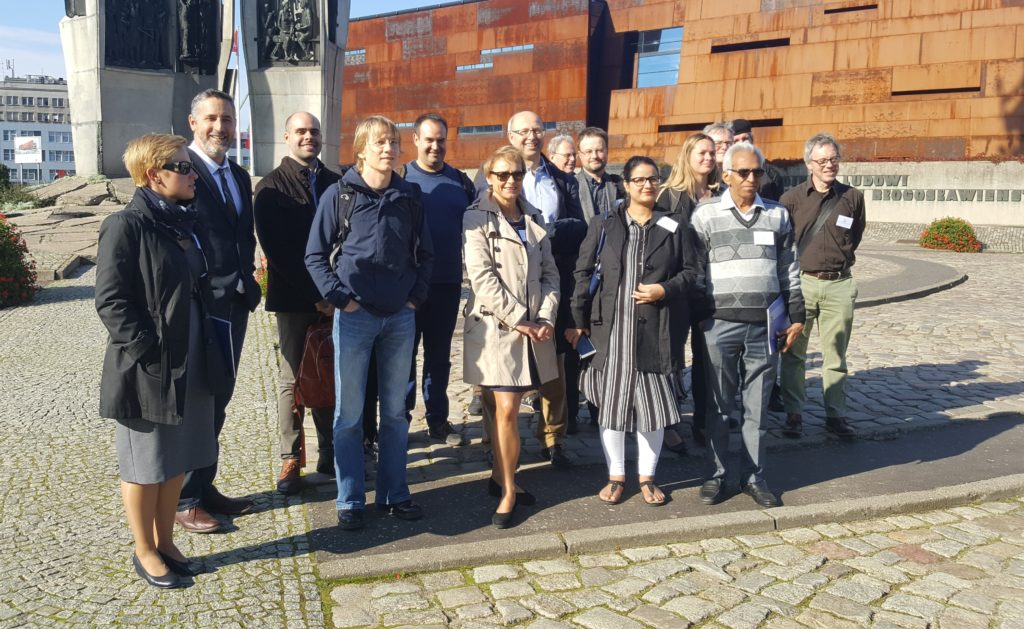Report on the RSA Research Network conference – Smart City-Regional Governance for Sustainability 2017

Smart City-Regional Governance for Sustainability – Spatial Smartness 21st and 22nd of September 2017, Gdańsk, Poland
By Gerd Lintz, Iwona Sagan and Tassilo Herrschel

The increasingly popular adjective ‘smart’ seems to be mostly associated with the term ‘smart city’ and the opportunities and risks associated with the use of new information and communication technologies (ICT) in urban development.
Driven by some big ICT companies eager to promote their systems, and place marketing strategies of a number of cities in the competitive setting of neo-liberal globalism, the use of ICT has been utilised as a branding instrument to project innovativeness, being ahead of the game and technologically astute.
‘Smart’ thus became associated with implicit progress and success. Many researchers, and policy makers, working in this field thus adopted this attractive branding.
However, this kind of monopolisation of the term ‘smart’ by this narrow content provoked a range of reactions. Some pointed out that it first was used for describing a new approach to urban planning to reconcile conflicting agendas: smart growth was the term to label the US-American version of sustainable spatial development aiming, in particular, at restricting urban sprawl, while enhancing ‘urbanity’. Others extended the content to more and more aspects of urban development, e.g. including more effective service delivery by local government, or a more efficient administration, or improved connectivity with the citizen as part of more democratic engagement and legitimation of policies. This led to a distinction between hard (physical, institutional) and soft (programmatic, ideational) smartness. In the end, acknowledging that the term is strategically used to make ideas and policies appear more attractive by ‘smartifying’ them, the term is being used for a wide variety of contents and meanings. This risks the danger of reducing it to a mere label, and raises the question whether, in a scientific sense, the term is helpful at all.
Against this background the RSA Network on ‘Smart City-Regional Governance for Sustainability’ was formed to explore the variety of approaches to, and practices in, city-regional governance.
Of special interest is the handling of competing and conflicting policy objectives and agendas, and whether the term ‘smart’ could be used to capture strategies of successfully dealing with complex, and potentially conflictual, concepts, agendas and practices in governing city regions. The starting point of the group has been the view that smartness can be interpreted in the sense of doing things in new and, thus, so a frequent assumption, more effective and successful ways. This particularly applies to innovative approaches to coordinating diverse and ‘separate’ interests, or balancing competing quests, such urban international competitiveness, national economic development, societal and territorial cohesion, as well as ecological concerns with the use of resources and quality of life. Here, ICT is one among many aspects.
After events in Dresden/Germany on ‘experimental smartness’ and Brussels/Belgium on data/informational smartness, the third network conference was held at the University of Gdańsk, Poland, in September 2017. The focus was on discussing ‘spatial smartness’. There were four keynote speeches and 15 paper presentations; and an attendance of 35 researchers and practitioners from eight countries – Canada, Germany, India, Italy, Poland, Spain, the UK, and the USA.
‘Spatial smartness’, as the main focus of the workshop, was discussed in a number of papers grouped in themed sessions. One of the main characteristics of spatial smartness refers to the innovative use of, and/or engagement with, territory in city-regional governance. This includes the projection of ‘soft’ or ‘virtual’ spaces as part of collaborative forms of governance, with limited institutionalisation, as in ‘new regionalism’, for instance.

Such spaces may be little more than the backcloth to city networks, or projected spaces of trans-border engagement and/or international representation and appeal for investment. Actually existing administratively defined territories of governing and representation may differ, creating mismatches between projected and actual geographies of city regions. The (conventional) alternative, of course, is redrawing administrative boundaries around areas of political-governmental control to ‘match’ them to de facto functional spaces. ‘Smartness’ may rest in the ability to overcome the mismatches without territorial re-organisation and restructuring.
The ‘spatial smartness’ discussion raises the question of territorialisation of politics. The ongoing debate in many countries about the necessity to establish metropolitan areas understood as soft spaces and the reluctance of the state governments to foster or impose such areas, well reflects the tensions between the functional logic and the threat of a change of existing geometries of power. In Poland as well as in other new democratic countries these dilemmas especially strongly influence the rationality of actions. The problem of spatial smartness thus also involves the quality and functionality of institutional embeddedness of territorial management.
Soft spaces need, of course, conventional fixed territories as vehicles for representation and democratic legitimacy, as well as execution of responsibilities for service delivery and governing as ‘actually existing’ statutory duties and responsibilities. But, against this complexity, how do we define a city region? Use formal structures to also provide a legitimate base for political decisions and also associated implementation (funding), or define on the basis of collective agreements as a more or less formalised network of municipal actors that follow opportunity-driven (time-limited) alliances? It is this question that needs to be further discussed: meanings and practices of governance vis-à-vis city-regions, however defined – functionally, strategically-representationally, or administratively. And how could ‘smartness’ help in its proposed creative, experimental and reconciliatory nature, seeking to match up different spatial constructs: functional, ideational and practical? This involves also trans-scalar relationships – of relational (network) city-regionalism and territorial administrative entities. Such may be placed in a matrix consisting of two variables: scale (local – regional) and ‘regionality’ (hard-soft, relational-territorial), with different city-regions located in different positions, based on their particular compromises between regional formality and scale.
This understanding of smartness would, at first glance, be quite a way away from the understanding based on ICT. However, upon second view, such ICT may provide at least part of a mechanism of linking the two dimensions (and their constantly changing nature). This will also depend on established practices and expectations of government and governance (role of placeness), and openness to novel ideas, which may depend on leadership.
Such questions will need to be addressed at the next workshop, possibly located in such a dynamic and complex, and thus fascinating, city-region as the Øresund (Danish–Swedish border). How do we define a city region at the intersection of the inter-/national and local, and the urban and rural? And, how do we thus bring together considerable inequalities and differences in ambitions, perspectives and priorities. The conflicting nature of urban and rural (peripheral) structures have become increasingly evident, not at least through populist politics.
This closely ties in with discussions of democracy, legitimacy and public participation, a topic that needs to be given more attention. Such was pointed out repeatedly at this workshop, especially in light of shifting politics vis-à-vis growing divisions between ‘winners’ and ‘losers’ in globalization, be that people or places.
What is the role of the state? Could ‘smartness’ embrace that as well, such as through better connectivity between the citizenry and political actors? While many strategies of urban development highlight constant learning and quick adaptation to an accelerating fluidity (partly caused by new technological developments), ever more people get the feeling of being overstrained and shut out from process and decision-making that affects them.
In response, they call for more state to ‘take back control’ over development, currently particularly regarding the easily noticeable impacts of international migration and trade. Would thus city-regions also be pushed back into a state-centric construct of administrative hierarchies? Smartness would imply to react to these concerns and seek to reconcile the different interests and agendas, as well as concepts and idealisms. Know the consequences and address them? Demand for smart people? What has to adapt to what – the order of priorities, or their very contents? Do we give way to algorithms as a way to find logical solutions but, perhaps, proposing just more of the same? Who benefits? ICT may not simply offer routes to clearer answers, but also lead to increasing spatial inequalities.
The next and last conference of this RSA Research Network on ‘Smart City-Regional Governance for Sustainability’ is going to deal with this topic of the role of the state and authority, and whether ‘institutional smartness’ could provide a more responsive, light-footed, flexible and innovative approach to the role of the state in governance than offered in conventional state-centric models.
For additional information click here
About Gerd, Iwona and Tassilo
Dr. Gerd Lintz is a senior researcher at the Leibniz Institute of Ecological Urban and Regional Development (IOER) in Dresden, Germany. His research focuses on local and regional environmental governance. He is also the RSA ambassador for Germany. g.lintz@ioer.de
Prof. Iwona Sagan is the Head of Department of Socio-Economic Geography, University of Gdansk, Poland. Her research mainly focuses on urban studies and regional development, urban and regional policy, social and economic transformation of post-socialist cities, quality of life. geois@univ.gda.pl
Dr. Tassilo Herrschel is Reader in Urban and Regional Development and Governance at the University of Westminster, London. His work revolves around comparative analysis of (smart) urban governance, the growing role of cities as international actors next to states, and the role of different national contexts, including regime ‘transition’ (democratisation). T.A.Herrschel@westminster.ac.uk